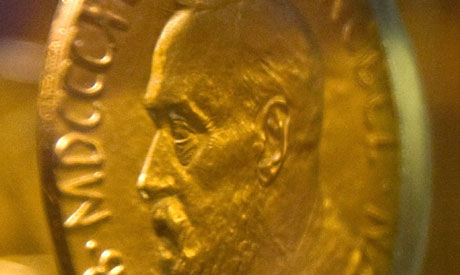
An 18-carat gold Nobel Peace Prize medal, awarded in 1921 to Norway's Christian L. Lange, seen in an exhibition at the Nobel Peace Centre in Oslo on December 9, 2009. (Reuters)
The 2015 Nobel Prizes are being announced this week and next. The $960,000 awards will be handed out in Stockholm and Oslo on Dec. 10, the anniversary of prize founder Alfred Nobel's death in 1896. Below is a look at the winners announced so far:
____
MEDICINE
The prize went to three scientists who helped create the world's leading malaria-fighting drug and another that has nearly wiped out two devastating tropical diseases, saving millions of lives.
Half the prize went to Tu Youyou — the first-ever Chinese medicine laureate — who took inspiration from traditional medicine to produce artemesinin, a drug that is now the top treatment for malaria.
The other half was shared by Japanese microbiologist Satoshi Omura and William Campbell, an Irish-born U.S. scientist, who created the drug avermectin. Derivatives of the drug have nearly rid the planet of river blindness and lymphatic filariasis, diseases caused by parasitic worms and spread by mosquitos and flies that affect millions of people in the developing world.
___
PHYSICS
The prize was awarded to Takaaki Kajita of Japan and Arthur McDonald of Canada, who made key contributions to experiments showing that neutrinos change identities.
These subatomic particles are created in nuclear reactions, such as in the sun and the stars, or in nuclear power plants.
With their discovery, Kajita and McDonald helped prove that neutrinos must have mass, thereby changing "our understanding of the innermost workings of matter," the Nobel committee said.
___
CHEMISTRY
The prize went to Sweden's Tomas Lindahl, American Paul Modrich and U.S.-Turkish scientist Aziz Sancar for their research into the way cells repair damaged DNA.
The Nobel committee said the trio's work "has provided fundamental knowledge of how a living cell functions."
Their findings have been used for the development of new cancer treatments, among other things.
___
LITERATURE
The prize went to Belarusian journalist Svetlana Alexievich for chronicling the great tragedies of the Soviet Union and its successor states through the voices of female soldiers, survivors of the Chernobyl nuclear disaster and former Soviet citizens dejected by the collapse of communism.
The Swedish Academy said Alexievich was chosen "for her polyphonic writings, a monument to suffering and courage in our time."
The academy's permanent secretary, Sara Danius praised her as a great and innovative writer who has "mapped the soul" of the Soviet and post-Soviet people and has developed "a new literary genre."
___
PEACE
The prize was awarded to a Tunisian democracy group "for its decisive contribution to the building of a pluralistic democracy" in the North African country following its 2011 revolution.
The Norwegian Nobel Committee cited the Tunisian National Dialogue Quartet for establishing "an alternative, peaceful political process at a time when the country was on the brink of civil war."
The group is made up of four key organizations in Tunisian civil society: the Tunisian General Labour Union; the Tunisian Confederation of Industry, Trade and Handicrafts; the Tunisian Human Rights League; and the Tunisian Order of Lawyers.
Short link: